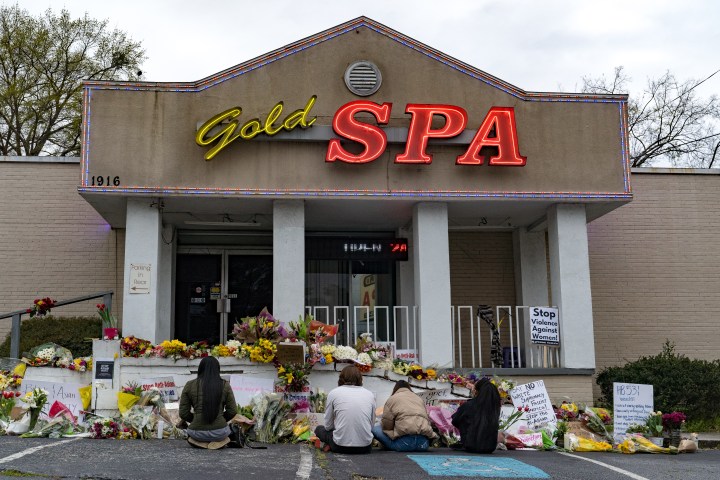
Atlanta shootings show Asian women’s vulnerability in the workplace

On March 16, a mass shooting at three Atlanta massage parlors left eight people dead, including six workers who were Asian women — a group already vulnerable to racism and sexism in the workplace.
A 21-year-old white man, who is in custody, is suspected of killing Soon Chung Park, 74; Hyun Jung Grant, 51; Suncha Kim, 69; Yong Ae Yue, 63; Xiaojie Tan, 49; Daoyou Feng, 44; Delaina Ashley Yaun, 33; and Paul Andre Michels, 54.
The attack occurred amid rising reports of hate crimes against Asian Americans. Police data from 16 American cities shows that anti-Asian hate crimes more than doubled in 2020, according to researchers at California State University, San Bernardino.
Asian Americans have been hit hard by the COVID-19 crisis. In the fourth quarter of last year, nearly half of Asian Americans who were unemployed had been out of work for more than six months, according to the Pew Research Center.
Karen Chen, executive director of the Chinese Progressive Association, told Marketplace that low-wage Asian American workers in her Boston community — many of them immigrants — had been laid off even before the shutdowns began.
“There are very high levels of poverty and economic hardship among so many Asian immigrant communities,” said Jennifer Jihye Chun, an associate professor in the Asian American studies department and the International Institute at the University of California, Los Angeles.
Chun pointed out that some of the victims were older Asian immigrant women, who already have to deal with meager job opportunities, especially if their English-speaking skills are limited.
Members of the victims’ families, many of whom were employees at these locations, talked about the sacrifices their slain family members had made for them.
Xiaojie Tan, along with her husband, ran Young’s Asian Massage — one of the spas the gunman targeted. Jami Webb, her daughter, told USA Today that “she did everything for me and for the family. She provided everything. She worked every day, 12 hours a day, so that me and our family would have a better life.”
Hyun Jung Grant’s son Randy Park told the Daily Beast that she was a “single mother of two kids who dedicated her whole life to raising them.”
Yong Ae Yue, who had emigrated from South Korea to the U.S., was laid off during the pandemic. Her sons told the Atlanta Journal-Constitution she was excited to return to work at a spa.
“My mother didn’t do anything wrong,” her son Robert Peterson told the AJC. “And she deserves the recognition that she is a human, she’s a community person like everyone else. None of those people deserved what happened to them.”
Miliann Kang, associate professor and director of diversity advancement at the University of Massachusetts Amherst, also noted that many of the victims were doing front-line service work, which comes with built-in risks.
“They absorb any complaints or any ill will already for any kind of work. Oftentimes, they are women,” said Kang, the author of “Managed Hand: Race, Gender, and the Body in Beauty Service Work.”
The alleged gunman told investigators he had a “sexual addiction” and that the victims were “a temptation for him that he wanted to eliminate.”
Red Canary Song, a grassroots collective of Asian and migrant sex workers, explained that these women faced “specific racialized gendered violence.”
“Whether or not they were actually sex workers or self-identified under that label, we know that as massage workers, they were subjected to sexualized violence stemming from the hatred of sex workers, Asian women, working class people, and immigrants,” the organization wrote in a statement.
The organization is calling for the rights and safety of Asian massage workers to be protected, among other demands.
“Sex work should not be pathologized or dehumanized or criminalized,” Kang said.
Organizations and GoFundMes accepting donations:
GoFundMe pages for families of victims and survivors
Suncha Kim
Yong Yue
Hyun Jung Grant
Paul Michels
Elcias Hernandez Ortiz
Delaina Ashley Yaun
Jami Webb, the daughter of Xiaojie Tan
Organizations within the Asian American Pacific Islander community
Asian Americans Advancing Justice — Atlanta: A “nonprofit advocacy organization dedicated to protecting the civil rights of Asian Americans, Native Hawaiians, and Pacific Islanders (AANHPI) in Georgia and the southeast.”
Asian American Feminist Collective: An intersectional feminist group that “provides spaces for identity exploration, political education, community building and advocacy.”
National Organization of Asians and Pacific Islanders Ending Sexual Violence: A group aimed at “supporting local and international community-based programs and governmental organizations in enhancing their services to victims of sexual violence from the Asian and Pacific Islander communities in the U.S., U.S. Territories in the Pacific, and Asia.”
Red Canary Song: A grassroots Chinese massage-parlor worker coalition in the U.S. that seeks to decriminalize sex work.
There’s a lot happening in the world. Through it all, Marketplace is here for you.
You rely on Marketplace to break down the world’s events and tell you how it affects you in a fact-based, approachable way. We rely on your financial support to keep making that possible.
Your donation today powers the independent journalism that you rely on. For just $5/month, you can help sustain Marketplace so we can keep reporting on the things that matter to you.


















